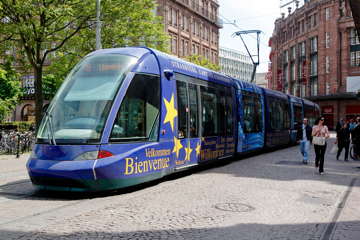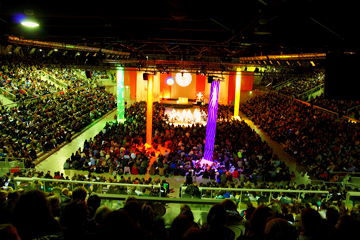
Preparation from September onwards
Starting in September, an international team comprising several brother of Taizé, sisters of St. Andrew and 15 young volunteers from various countries have been visiting and meeting local people all over the region. In all 210 neighbourhood welcome points were set up, often by ecumenical cooperation, in Strasbourg itself, in the surrounding urban area, and in many villages on both the French and German sides of the Rhine. All the various churches of the region supported the meeting from its inception.
The volunteers are standing ready
Thursday 26th December, 1500 volunteers arrived in Strasbourg, two days before the beginning of the meeting. All through the morning, they received the explanations, their itineraries and their work for the two following days.They were sent to the parishes of the city and of the urban community, the only ones to welcome those young people who arrived early, before the young people were welcomed by the host families.
Friday 27th, the welcome teams for all the languages are formed, the different choirs practising, the last decorations installed in the places of prayer, the teams charged with organising the circulation of people and the food distribution received all the important instructions... it is the eve of the big day. To note: before the crowds arrive, the prayers of the day must be transferred to a bigger place, an indication of the significant participation of the people of the region.
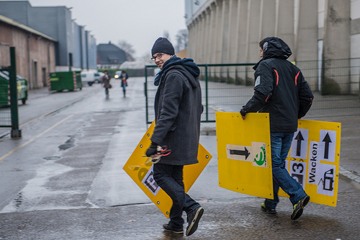
Here is a selection of some reactions of volunteers.
Aleksander (Lublin, Poland)
The magic of Taizé is that even tired from the trip, you want to participate in the prayers, meet new people and experience the solidarity among pilgrims. It is an experience I will remember for a long time!
Gonçalo (Lisbon)
Tired, but with great hopes for this meeting. It will be very enriching for me to take part in the workshops, meet up with old friends and make new ones too!
Beatrice (Milan)
What a beautiful atmosphere! —you feel the spirit of Taizé in Strasbourg!
Tomasz (Wrocław, Poland)
I feel as if I am coming home to attend a family reunion. So many friendships! So many smiling, friendly faces, the Holy Spirit is present everywhere!
Marianna (Mexico)
Florent (France)
As a result, I did not have much free time but, as Brother Alois said, “when we give help, often we receive something ourselves.” And it is true that the many smiles and the joy of the pilgrims gave me a lot and encouraged me in what I was doing!
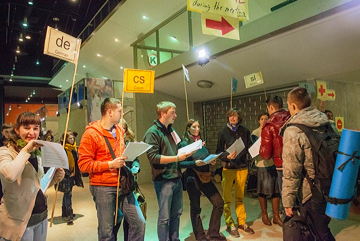
Mary (South Korea)
The great commitment of the local parishes
Reception on 28 December went well. Several hundred buses streamed into Strasbourg all morning. The reception points opened at 7am to give explanations in more than 20 languages. Then the participants were sent out to 210 host parishes throughout Strasbourg, its suburbs, and Alsace and Ortenau.
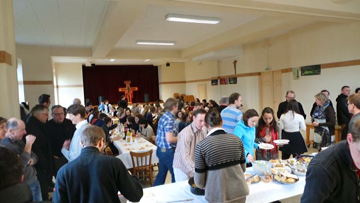
Tania (Zhytomir, Ukraine)
Jürgen (Sélestat, France)
Babeth (Strasbourg, France)
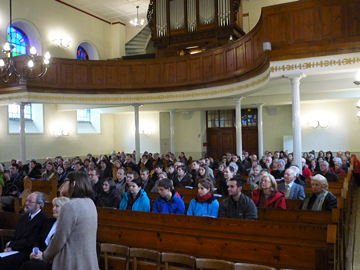
Nicolas (France)
What he did not know was that the Protestant Church was also holding a service with youth who had come for the Taizé meeting. The pastor who arrived saw the priest waiting patiently for a car. By chance they knew each other and, happy with this turn of events, the pastor invited the waiting priest to participate in worship by reading a Bible reading. rather hesitatingly, the priest agreed to do this instead of going to the mass. He came out in wonderment at his experience and at the fact that he had been at that particular moment in front of the church. You should have seen his face beaming during the meal, when he told his story and how he had enjoyed the worship - telling us in passing that this was the first time he had entered a Protestant Church…
Hospitality
Several weeks before Christmas, it was already clear that all the participants would be accomodated in private homes. Brother Alois wished to emphasise his message of thanks:
All young people have been accommodated in families. Many people said to us before they left how much they were touched by the warmth of your welcome. That thousands of people opened their doors to young people they did not know, at a time when we are often afraid of strangers, underlines the communion of the church and deepens understanding between peoples.
Approximately 8,000 people or families decided to open their doors to welcome young people. They did not know their names, or even their countries of origin in advance. Adrian, a young seminarian from Mexico who has lived in Strasbourg for three years, said: many Alsatians realised that they were ready to open their home to strangers, and that was often a completely new experience.
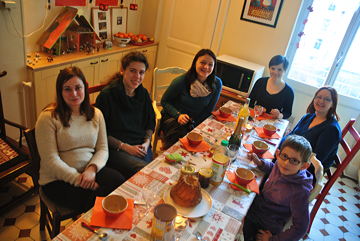
Philippe (Lipsheim, France)
Artur (Poland)
It took my breath away when I saw the unity of the people who were preparing the meeting in my host parish. The Catholics and Protestants were working together with the same aim. This is an image of the Church I will keep in my heart.
The logistical challenge
For the first time, the region welcoming us was both cross-border and bilingual. Almost a third of participants were welcomed in Germany, which involved a major organisational effort for the transport: almost 15000 young people travelled each day between the central location and the parishes where they were welcomed thanks to 210 shuttle buses, morning and evening. What’s more, 6 trams and a train to Colmar were specially put on for the meeting.
A video shows the "ballet of the special buses" as they leave Wacken.
For the meals, a few numbers:
• 60,000 apples
• 90,000 mandarins
• 140,000 30 to 40g biscuits
• 30,000 hard boiled eggs
• 120,000 individual bread rolls
• 20,000 mini pretzels
• 1,200 kg of instant lemon tea powder, with which around 20,000 litres of hot tea were served.
• 600 palettes of food
At the meeting, an effort was made to be environmentally friendly:
• a large number of bikes were hired from the City of Strasbourg for the preparation team.
• for the first time, young people were invited to bring their own bag for the meals, avoiding the distribution of 20,000 plastic bags each day.
• one parish gave all the participants a plsitc cup with the logo of the meeting as a "lasting souvenir".
Martine (Ameugny, France)
The programme
Each morning, there was prayer and small sharing groups in the parishes; at midday common prayer took place simultaneously in five places; in the afternoon, around twenty places in the city centre hosted different workshops; in the evening after the distribution of the meal, the common prayer took place in the same places as midday, with the young people going to a different place each day.
One of the 48 afternoon workshops took place in the European Parliament, in the great chamber with representatives from different countries and 1550 young people. Several workshops dealt with problems faced by Europe, reflecting the presence of several international institutions in Strasbourg. Other workshops were very popular, such as those at the synagogue with the chief Rabbi, or at the mosque where there were almost 2000 young people.
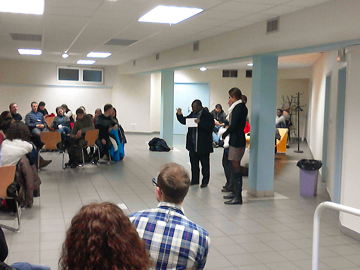
On the afternoon of 31st December, the participants gathered together by country for a reflection with a brother, allowing them to discuss, in their own language, the experiences lived during these days and to reflect on how to continue the pilgrimage back at home.
David (France)
Ivan (Zagreb, Croatia)
The following day, after the afternoon prayer in the Cathedral, we participated in a workshop held in the crypt of the Cathedral. Attracted by the “gigantic and delicate marvel” of the building, we wanted to explore its crypt, where we, once again enjoyed the music and poetry of the Alsace region.
The common prayers
The prayers took place simultaneously in the cathedral, the Reformed Church of Saint Paul and three halls at Wacken, Strasbourg’s exhibition centre. These three halls were decorated differently, following three themes:
• at Rhénus Nord, the Rhine River
• at Rhénus Sport, the cloister garden
• at Hall 21, the Vine
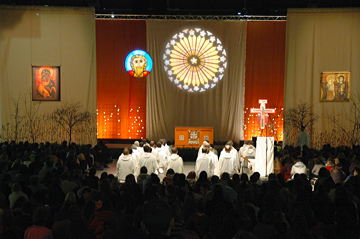
Five more elements could be found in all the places of prayer:
• The Christ of Wissembourg – ancient stained glass window from the church of St Peter and Paul in the city, representing the head of Christ.
• Projection of a Rose window (the two churches both have their own rose window)
• The light of Bethlehem
• The icon of Friendship
• The icon of Mary
Note that in the Reformed Church of Saint Paul, the five stained glass windows in the chancel were the work of Brother Eric of Taize.
Philippe (Strasbourg)
Gérard (Soultz, France)
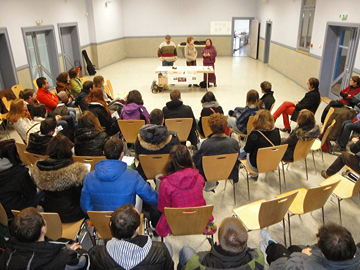
Into the New Year
On the evening of 31st December, at 11pm, the young people met together in their host churches for a vigil of prayer for peace until midnight. After the traditional new year’s greetings, each nationality was invited to present to the others something of their culture, a song, a dance, ... It was a powerful moment of encounter, and a unique way to welcome the new year.
Quinny (The Netherlands)
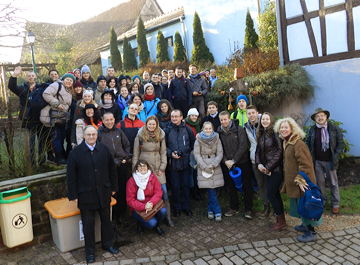
Tatiana (Mukachevo, Ukraine)
Pierre (Hoerdt, France)
Then they went away again, by the same road, leaving behind them, in our aging communities (they who thought they had come to meet only with young people), a little stardust sown by their youthfulness, a few open windows through which the spirit rushed in to remind us that, 2000 years on, the gospel can still make people get up and set off on a journey. Thank you to you, pilgrims of trust, thank you for this gift that you gave us, perhaps without even really realising it.
Echoes in the media
We received many message of thanks following the live broadcasts of the prayers by different media outlets. We can still relive these prayers thanks to KTO, RCF and Domradio.
The local churches put in place a "web studio" to allow young people to record a message; messages recorded by the programme "Paraboles" can also be seen online.
Among the articles about the meeting, here are some to note, published on the websites of L’Alsace, La Vie, Mediapart, Rue 89, Mittelbadische Presse, Badische Zeitung, Badisches Tagblatt or on the website "Wiara".
The television channel France 3 broadcast a series of interviews and reports from the meeting. Other channels also broadcast a report, such as TF1.
There were several radio programmes about the meeting in Strasbourg, for example on France Bleu Alsace or Radio-Télévision Suisse.
Finally, several photographers have published their photos online: Wiesia Klemens, Claude Truong-Ngoc, Milan Szypura, Benedek Pozsgay
 TAIZÉ
TAIZÉ